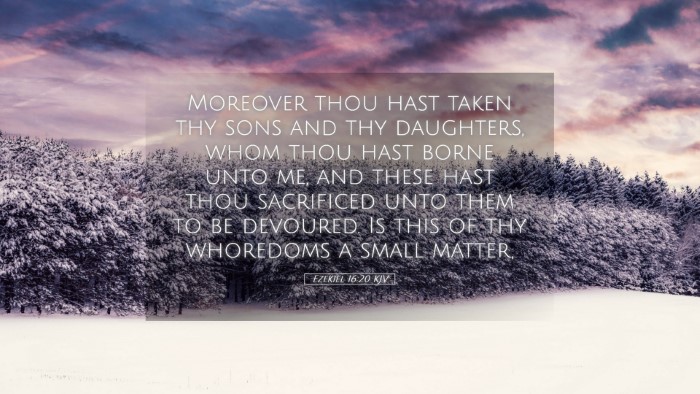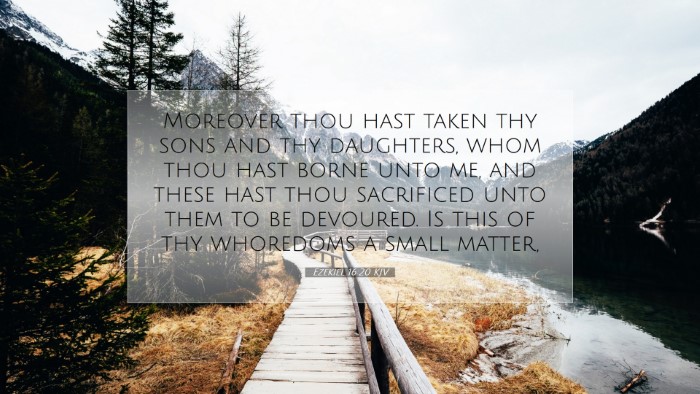Bible Commentary on Ezekiel 16:20
Verse Text: "And thou hast taken thy sons and thy daughters, whom thou hast borne unto me, and these hast thou sacrificed unto them to be devoured. Is this of thy whoredoms a small matter?" (Ezekiel 16:20, KJV)
Introduction
This verse is a part of a profound and emotive discourse delivered by the prophet Ezekiel. It illustrates God's deep anguish over Israel's unfaithfulness, likened to that of a spurned spouse. The betrayal of the covenant relationship is central to the text, as it reveals the grievous sins of idolatry the people committed, even sacrificing their children to foreign deities. This commentary seeks to unpack the theological implications of this verse, drawing insights from renowned public domain commentaries by Matthew Henry, Albert Barnes, and Adam Clarke.
Theological Insights
-
Matthew Henry's Perspective:
Henry underscores the severity of Israel’s idolatry. He points out that by sacrificing the children 'whom thou hast borne unto me', the Israelites not only forsook God but also displayed an utter disregard for divine ownership over their lives. This act of sacrifice symbolized a profound spiritual corruption, showing that they had exchanged the love of the covenant for detestable practices.
-
Albert Barnes' Commentary:
Barnes emphasizes the horror of the act of sacrifice. He observes that by using their children in worship to idols, the Israelites transgressed not only the moral law but also the specific guidance provided by God. He remarks on the rhetorical question: "Is this of thy whoredoms a small matter?" indicating that such betrayal is significant, revealing the depths of Israel’s infidelity and lack of remorse.
-
Adam Clarke’s Analysis:
Clarke also highlights the emotional aspect of this verse. He notes that God’s reproach is not merely about the act of sacrifice, but it embodies a betrayal of their relation to Him as a father. Clarke reflects on the gravity of the situation by mentioning that such actions would exacerbate God's fury and would not go unpunished, revealing the impassioned tone of God's warning through the prophet Ezekiel.
Historical Context
The historical backdrop of this passage includes the circumstances surrounding the Babylonian exile. Israel had consistently turned to idol worship over the centuries, a fact which Ezekiel points out decisively in this chapter. This portion of Scripture serves as a reminder of the covenant relationship between God and Israel and the dire consequences of infidelity. The harsh language of 'whoredoms' and 'sacrifices' serves to awaken Israel from its spiritual lethargy and to admonish them of their grievous errors.
Spiritual Reflection
This verse compels readers to reflect on their own commitments and allegiances. Just as ancient Israel was tempted to turn to foreign gods, modern believers must consider the distractions and idols clamoring for their attention. The emotional appeal present in this text beckons believers to evaluate their own lives, challenging them to forsake spiritual apathy that could lead to similar consequences.
Furthermore, it emphasizes the sanctity of life and the responsibility of parents and guardians to nurture and protect their children spiritually. The spiritual metaphor used here is profound, demonstrating the grave dangers of leading the next generation away from God.
Theological Implications
As Ezekiel articulates God's sorrow, this passage presents important theological implications surrounding covenant fidelity, sacrifice, and accountability. The act of sacrificing children, in particular, raises questions regarding our commitment to God and the cost of sin. It reflects God's perspective on sin's defilement and its consequences, as He calls for a return to righteous living and worship.
This text can also serve as a warning to the contemporary church about the cultural sacrifices made at the altar of convenience, whether in moral choices, ethical stands, or the abandonment of doctrinal truths. Reflecting on the intensity of God's word here invites discussion about how modern believers can avoid the same pitfalls that Israel faced.
Conclusion
Ezekiel 16:20 serves as a sobering reminder of the dangers of spiritual infidelity. The insights provided by Matthew Henry, Albert Barnes, and Adam Clarke draw attention to the grievous nature of idolatry and the emotional turbulence it causes in the divine-human relationship. As pastors, students, theologians, and scholars reflect on this text, it is essential to grasp the weight of God's call to repentance and fidelity, both personally and collectively as the body of Christ.
In embracing the lessons from this verse, we are called to wrestle with our own spiritual priorities, urging us to hold fast to the commitment we made to God who is capable of great love and great wrath. The hope lies in genuine repentance, leading to restoration in our covenant relationship with Him.


